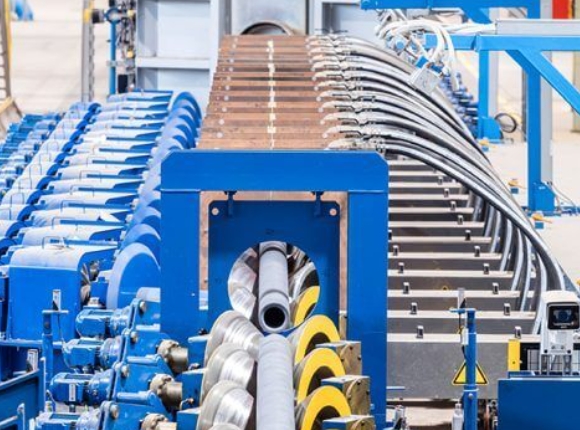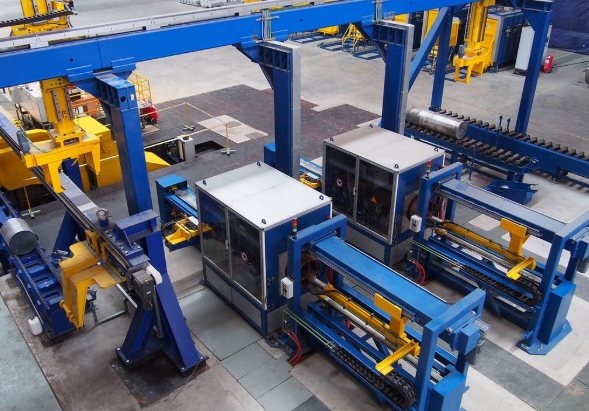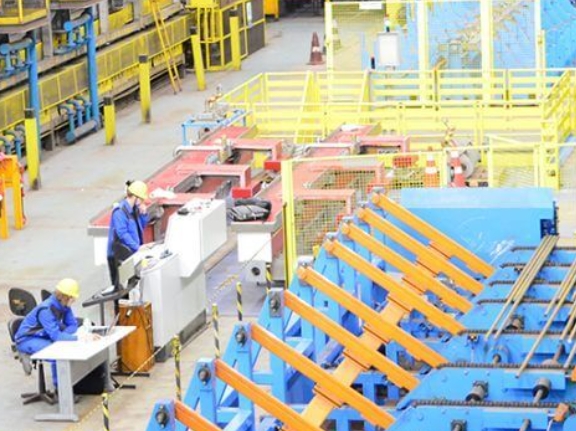Content Menu
● What is a Quenching System?
● Why Quenching Systems Matter in Metal Processing
● Top Quenching System Manufacturers and Suppliers in Russia
>> 1. SMS Group
>>> Key Features and Achievements
>> 2. Inductotherm Group
>>> Key Features and Achievements
>> 3. Tenova LOI Thermprocess
>>> Key Features and Achievements
>> 4. Nakal - Industrial Furnaces, JSC
>>> Key Features and Achievements
>> 5. RUSSTANCOM INZHINIRING
>>> Key Features and Achievements
>> 6. GEA Group
>>> Key Features and Achievements
● Case Studies: Advanced Quenching Installations in Russia
>> TMK Seversky Pipe Plant – SMS Group
>> Metalloinvest Ural Steel – Tenova LOI Thermprocess
>> Round Steel Quenching and Tempering Line
● Technological Trends in Russian Quenching Systems
>> Automation and Digitalization
>> Energy Efficiency and Sustainability
>> Customization and Flexibility
>> Integration with Broader Production Lines
>> Advanced Materials and Surface Treatments
● The Global Reach of Russian Quenching System Suppliers
● The Role of OEM and Custom Solutions
● Conclusion
● Frequently Asked Questions
>> 1. What are the main types of quenching systems used in Russia?
>> 2. How do Russian quenching system manufacturers ensure product quality?
>> 3. Which industries benefit most from Russian quenching system suppliers?
>> 4. Are Russian quenching systems exported internationally?
>> 5. What are the latest trends in quenching system technology?
The Russian industrial landscape is renowned for its robust metallurgy and advanced manufacturing capabilities, particularly in the field of steel and nonferrous metal processing. Central to these industries is the application of cutting-edge quenching systems—technologies that are vital for enhancing the mechanical properties, durability, and overall quality of metal products. As global demand for high-performance steel and alloy components continues to rise, quenching system manufacturers and suppliers in Russia have established themselves as key players, both domestically and on the international stage.
This comprehensive article delves into the world of Russian quenching system suppliers, exploring their technological innovations, notable projects, and the evolving trends shaping the industry. Whether you are a procurement specialist, a plant engineer, or an industry analyst, this guide will provide valuable insights into the capabilities and strengths of Russia's leading quenching system providers.

What is a Quenching System?
A quenching system is an industrial installation designed to rapidly cool heated metals—such as steel, aluminum, or other alloys—using water, oil, air, or specialized gases. This rapid cooling process is a critical step in heat treatment, as it transforms the microstructure of metals, imparting desirable mechanical properties such as increased hardness, strength, and toughness. Quenching is often followed by tempering or other heat treatments to fine-tune these properties for specific applications.
Quenching systems can be highly automated and customized, ranging from water spray lines for steel pipes to induction-based systems for precise, localized treatment. The choice of quenching medium and system design depends on the type of metal, product geometry, and desired final properties.
Why Quenching Systems Matter in Metal Processing
The importance of advanced quenching systems in metal processing cannot be overstated. Here are several reasons why they are indispensable:
- Mechanical Enhancement: Quenching dramatically improves the mechanical characteristics of metals, making them suitable for demanding applications such as oil and gas pipelines, automotive components, and structural beams.
- Uniformity and Consistency: Modern quenching lines ensure that each product receives uniform treatment, resulting in consistent mechanical properties across large production batches.
- Production Efficiency: Automated quenching systems minimize human error, reduce processing times, and enable high-throughput manufacturing, which is essential for meeting global market demands.
- Energy and Resource Optimization: State-of-the-art quenching systems are designed to optimize water and energy usage, reducing operational costs and environmental impact.
- Customization and Flexibility: Leading manufacturers offer tailored solutions that accommodate a wide range of product sizes, shapes, and material specifications.
Top Quenching System Manufacturers and Suppliers in Russia
Russia's metallurgical sector is supported by a diverse array of quenching system manufacturers and suppliers, many of whom have established strong reputations for quality, innovation, and reliability. Below are some of the most prominent companies in this field.
1. SMS Group
SMS Group stands as a global leader in plant construction and mechanical engineering for the steel and nonferrous metals industry. In Russia, SMS Group has made significant contributions through the supply of advanced, fully automated quenching and tempering heat treatment lines. One of their flagship projects is the installation at TMK's Seversky Pipe Plant, which is recognized as one of the world's most productive quenching and tempering lines.
Key Features and Achievements
- High Capacity: The SMS Group's line at TMK Seversky boasts an annual capacity of up to 300,000 tons of pipes, accommodating diameters from 168 to 370 mm and wall thicknesses up to 40 mm.
- Innovative Technology: Their patented inner quenching lance enables efficient cooling of thick-walled pipes, increasing process speed by approximately 40% compared to conventional systems.
- Full Automation: The line is equipped with comprehensive automation, water treatment, and electrical systems, ensuring seamless operation and minimal manual intervention.
- Quality Assurance: The advanced control systems guarantee uniform quenching, resulting in superior product quality and reduced rejection rates.
2. Inductotherm Group
The Inductotherm Group is a prominent provider of induction heating and quenching systems, with a strong presence in Russia through its Moscow subsidiary. Inductotherm's expertise lies in the design and manufacture of induction-based heat treatment equipment, which is widely used for the precise and efficient quenching of steel bars, tubes, and other components.
Key Features and Achievements
- Comprehensive Solutions: Inductotherm supplies induction heating equipment, power conversion systems, and recirculating cooling systems, offering end-to-end solutions for industrial heat treatment.
- Local Support: The company provides technical support, spare parts, and maintenance services within Russia, ensuring high equipment uptime and customer satisfaction.
- Process Flexibility: Induction quenching allows for precise control over heating and cooling rates, making it ideal for complex geometries and specialized applications.
3. Tenova LOI Thermprocess
Tenova LOI Thermprocess is a global leader in heat treatment technology and has supplied advanced quenching equipment to major Russian steelmakers, including Metalloinvest's Ural Steel plant.
Key Features and Achievements
- Advanced Furnace Technology: Tenova's roller hearth heat treatment furnaces and rolling quenching machines are designed for high uniformity and efficiency, supporting the production of heavy plate and structural steel.
- Capacity Expansion: Their installations have enabled clients like Ural Steel to triple their output of heat-treated heavy plate and significantly increase the production of steel for critical infrastructure projects.
- Process Integration: Tenova's systems are often integrated with upstream and downstream processes, streamlining production and enhancing overall plant productivity.
4. Nakal - Industrial Furnaces, JSC
Nakal is a Russian manufacturer specializing in industrial furnaces for quenching, tempering, annealing, and chemical heat treatment. The company is known for its ability to deliver customized furnace solutions tailored to the specific needs of its clients.
Key Features and Achievements
- Customization: Nakal's product portfolio includes both standard and bespoke furnace designs, catering to a wide range of industrial applications from large-scale steel plants to niche manufacturers.
- Versatility: Their furnaces support various heat treatment processes, making them a preferred choice for clients seeking flexibility and adaptability.
5. RUSSTANCOM INZHINIRING
RUSSTANCOM INZHINIRING is recognized for its innovative surface plasma quenching technology, which is showcased at leading industry exhibitions and adopted by forward-thinking manufacturers.
Key Features and Achievements
- Surface Plasma Quenching: This technology enhances surface hardness and wear resistance, making it ideal for components subject to high friction and mechanical stress.
- Research and Development: RUSSTANCOM invests heavily in R&D, ensuring that its solutions remain at the forefront of technological advancement.
6. GEA Group
GEA Group is a global engineering company that provides hot gas quench systems for rapid cooling in harsh industrial environments. Their solutions are particularly suitable for gas streams and emission control in metallurgical plants.
Key Features and Achievements
- High Capacity: GEA's systems handle gas flows up to 300,000 m³/h and temperatures up to 1,300°C, making them suitable for large-scale operations.
- Durability: The use of corrosion-resistant materials ensures long service life, even in aggressive environments.
- Technological Innovation: GEA employs advanced spray nozzle and atomization technologies to maximize cooling efficiency and minimize operational costs.

Case Studies: Advanced Quenching Installations in Russia
TMK Seversky Pipe Plant – SMS Group
At the TMK Seversky Pipe Plant, SMS Group installed a fully automated quenching and tempering line that has set new benchmarks for productivity and process control. The line's innovative inner quenching lance technology enables the rapid and uniform cooling of thick-walled pipes, which are essential for oil and gas transmission. The result is a significant increase in production speed, improved product quality, and enhanced competitiveness in global markets.
Metalloinvest Ural Steel – Tenova LOI Thermprocess
Tenova's installation at Metalloinvest's Ural Steel plant includes a roller hearth heat treatment furnace and a rolling quenching machine. This setup has allowed Ural Steel to triple its production of heat-treated heavy plate and increase the output of steel for bridge construction by 39%. The advanced process control ensures uniformity in product properties, which is critical for meeting stringent international standards.
Round Steel Quenching and Tempering Line
International cooperation is evident in the installation of round steel quenching and tempering lines supplied by leading Chinese manufacturers. These lines incorporate induction heating, PLC-based automation, and integrated quality control systems. The result is improved mechanical properties—such as tensile strength, bending resistance, and fatigue life—making the products suitable for demanding engineering applications.
Technological Trends in Russian Quenching Systems
The Russian quenching system market is characterized by rapid technological evolution. Several key trends are shaping the future of this industry:
Automation and Digitalization
Modern quenching lines are increasingly automated, featuring real-time process monitoring, data analytics, and advanced control systems. Automation not only improves consistency and quality but also reduces labor costs and enhances workplace safety.
Energy Efficiency and Sustainability
With growing emphasis on environmental responsibility, manufacturers are developing quenching systems that minimize energy consumption and optimize water usage. Innovations such as closed-loop water recycling and heat recovery systems are becoming standard features.
Customization and Flexibility
Customers demand quenching solutions tailored to their specific production needs. Russian manufacturers are responding by offering modular systems that can be easily adapted to different product sizes, shapes, and material types.
Integration with Broader Production Lines
Quenching systems are now often integrated with upstream processes like rolling and downstream operations such as tempering and finishing. This holistic approach streamlines production, reduces bottlenecks, and improves overall plant efficiency.
Advanced Materials and Surface Treatments
The use of advanced materials in quenching system construction—such as high-alloy steels and corrosion-resistant components—extends equipment lifespan and reliability. Surface treatments, including plasma quenching, further enhance the performance and durability of finished products.
The Global Reach of Russian Quenching System Suppliers
Russian quenching system manufacturers and suppliers are not only serving the domestic market but are also active participants in the global supply chain. Their technologies are exported to over 80 countries, supporting industries as diverse as oil and gas, construction, automotive, and heavy machinery. This international presence is a testament to the quality, reliability, and innovation of Russian engineering.
The Role of OEM and Custom Solutions
Many Russian manufacturers offer OEM (Original Equipment Manufacturer) and custom engineering services to meet the unique requirements of foreign brand owners, wholesalers, and producers. These services include:
- Design and Prototyping: Collaborative development of specialized quenching systems for unique applications.
- Turnkey Solutions: End-to-end project management, from initial concept to installation and commissioning.
- After-Sales Support: Comprehensive maintenance, spare parts supply, and technical training to ensure long-term operational success.
Conclusion
The landscape of quenching system manufacturers and suppliers in Russia is marked by technological excellence, innovation, and a strong commitment to quality. Companies such as SMS Group, Inductotherm Group, Tenova LOI Thermprocess, Nakal, RUSSTANCOM INZHINIRING, and GEA Group have established themselves as leaders in the field, delivering advanced solutions that meet the evolving needs of the global metal processing industry. As automation, digitalization, and sustainability continue to drive the industry forward, Russian quenching system providers are well-positioned to maintain their leadership and expand their influence in both domestic and international markets.

Frequently Asked Questions
1. What are the main types of quenching systems used in Russia?
The main types include water quenching lines, induction quenching systems, hot gas quench systems, and surface plasma quenching technologies. Each type is designed for specific metals, product geometries, and desired mechanical properties.
2. How do Russian quenching system manufacturers ensure product quality?
Manufacturers employ advanced automation, patented technologies, and strict process controls. These measures guarantee uniform cooling, consistent product quality, and compliance with international standards.
3. Which industries benefit most from Russian quenching system suppliers?
Key beneficiaries include the oil and gas sector (for OCTG pipes), construction (for heavy plate and structural steel), automotive, and machinery manufacturing industries.
4. Are Russian quenching systems exported internationally?
Yes, Russian manufacturers and their international partners export quenching systems and finished products to over 80 countries, reinforcing Russia's position in the global steel and metal processing market.
5. What are the latest trends in quenching system technology?
Current trends include increased automation and digitalization, energy-efficient designs, modular and customizable systems, and integration with broader heat treatment and finishing lines.













